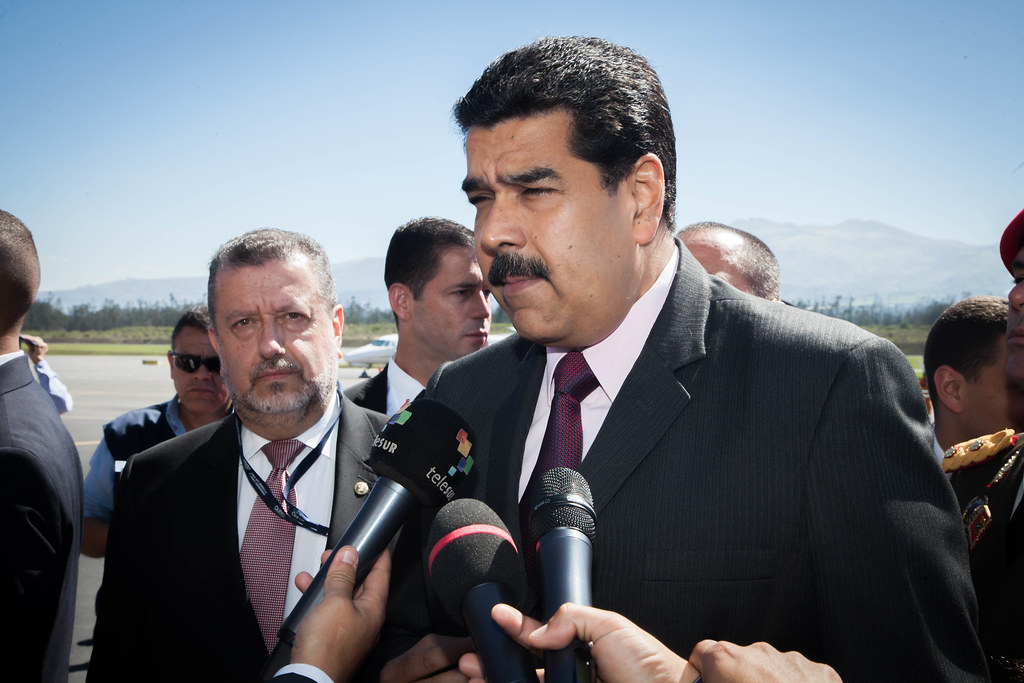Andreína Chávez Alava for Venezuelanalysis
In a letter to US President Donald Trump, Venezuelan President Nicolás Maduro urged peace and renewed dialogue. He also dismissed the drug-trafficking allegations leveled against Caracas as unfounded.
In the September 6 missive delivered to the White House, Maduro described the claim that Caracas had refused to accept deported migrants, and the assertion of ties to “mafias and drug-trafficking gangs,” as “fake news” and “absolutely false.”
“This [the drug trafficking claims] is the worst of the fake news that has been launched against our country, used to justify an escalation to armed conflict that would inflict catastrophic damage on the entire continent,” read the letter released on Sunday.
President Maduro reaffirmed that “Venezuela is a territory free of drug production and not a significant player in narcotics trade,” citing the latest UN World Drug Report and other international organizations.
A map attached to the letter shows that 87 per cent of drugs produced in Colombia reach the US and Europe via the Pacific, while 8 per cent transit through Colombia’s Guajira region and the Caribbean coast, with only 5 per cent passing through Venezuela. The UN data coincides with the most recent Drug Enforcement Agency (DEA) report, which found that less than 10 percent of US-bound cocaine flows through Venezuela.
The Venezuelan leader urged Trump to “preserve peace in the hemisphere” and said his government was open to reestablishing dialogue with the US through White House Special Envoy Richard Grenell, who met with Maduro in January following Trump’s inauguration.
Grenell facilitated talks with Caracas on issues such as the return of Venezuelan migrants and the release of US citizens detained in Venezuela. Speaking at a recent conference in Paraguay, Grenell expressed his hope that dialogue and diplomacy would lead to agreements being reached and wars being avoided.
The special envoy was sidelined by US Secretary of State Marco Rubio, who has pursued a hardline stance toward Maduro, renewing the “extreme pressure” campaign from Trump’s first administration (2017–2020), which saw the imposition of wide-reaching economic sanctions and an oil blockade.
Recently, Rubio told Fox News that President Maduro was a “fugitive of American justice” and reiterated that the US military deployment in the Caribbean is meant to target alleged Caracas-tied cartels.
White House press secretary Karoline Leavitt confirmed Tuesday that the Trump administration had received Maduro’s letter but dismissed it. She maintained that Washington’s Venezuela policy “has not changed” and doubled down on drug trafficking allegations.
In a press conference last week, Maduro accused hardline elements within Trump’s government of trying to provoke Venezuela into a war for oil-driven regime change. He confirmed that communications with Washington had been restricted to minimal contact via Colombia-based US Chargé d’Affaires John McNamara, with the primary goal of coordinating the repatriation of migrants.
Caracas broke diplomatic ties with the US in 2019 after the White House recognized the self-proclaimed “interim government” led by Juan Guaidó. Caracas has reiterated its willingness for renewed, “respect-based” relations.
Maduro’s letter to Trump comes amid rising concerns about possible US military intervention in Venezuela, which could threaten regional peace and stability.
Since August, Washington has deployed about 4,500 troops to the southern Caribbean Sea, off Venezuela’s coasts, along with a nuclear-propelled submarine, eight warships, fighter jets, and other aircraft, in what it calls a crackdown on drug trafficking.
In recent weeks, US forces have struck three alleged drug-carrying, US-bound boats, killing 17 people in total. The first two strikes took place on September 2 and 15, with the most recent one informed by Trump on Truth Social on September 19.
Washington has not provided evidence that the crews were transporting narcotics. Legal experts believe the bombings violate maritime law and international human rights laws, and that US actions amount to extrajudicial killings.
The military build-up came after the Trump administration raised the bounty for Maduro’s arrest to $50 million, accusing high-ranking officials of running the so-called “Cartel de los Soles,” which was added to the US terrorist designation list, and of collaborating with Colombian armed groups and the Mexican Sinaloa cartel to “flood” the US with narcotics.
However, US officials have never provided court-backed evidence to support the charges. Colombia’s Gustavo Petro and Mexico’s Claudia Sheinbaum have both asserted that there is no evidence that the so-called cartel exists or that any Venezuela-led transnational drug trafficking outfit operates in the region.
Edited by Cira Pascual Marquina in Caracas.

